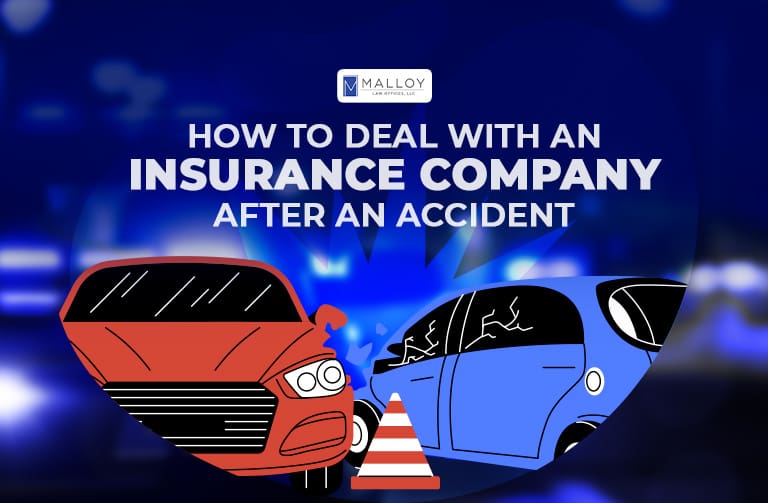Tips for Dealing with an Insurance Company After an Accident
Dealing with an insurance company after an accident can feel overwhelming, especially when you’re already dealing with the physical and emotional fallout of the incident. Whether you’re handling your own insurance or dealing with the other party’s insurer, understanding how to navigate the process is crucial to protecting your rights and ensuring you receive fair compensation. This week’s blog post from Malloy Law Offices will provide tips for dealing with an insurance company after an accident.
Report the Accident Promptly
Promptly reporting any accident to your insurance company is the obvious first step as soon as you can be certain that your health is not in any immediate danger. Failure to report an accident expediently can negatively impact your claim. Be sure to avoid this unforced error in dealing with an insurance company. Speak clearly, concisely, and factually. Do not speculate on questions of fault and liability. Those are best left to the professionals.
Understand Your Policy
Take time to review your insurance policy to understand the type of coverage you have. Knowing the limits of your coverage for property damage, medical expenses, and other benefits can help guide your conversations with your insurance company. Familiarize yourself with key terms such as “liability,” “uninsured motorist coverage,” and “personal injury protection” (PIP) so you’re prepared when speaking with the claims adjuster.
Document Everything
Accurate documentation is key to supporting your claim. After the accident, take the following steps to gather evidence:
- Photos and Videos: Capture clear photos and videos of the accident scene, the vehicles involved, and any visible injuries. These can provide critical evidence later.
- Police Report: Request a copy of the police report, as it is an official account of the incident and may include information about who was at fault.
- Medical Records: Keep detailed records of any medical treatment you receive. Document injuries, doctor visits, treatments, and prescribed medications.
- Witness Information: If there were witnesses to the accident, get their contact information. Their statements can support your version of events.
Be Cautious When Speaking With Adjusters
Insurance adjusters are skilled negotiators whose job is to minimize the amount paid on claims. While it’s important to cooperate, be cautious in your conversations with them. Stick to the facts and avoid giving a recorded statement until you’re sure of the full extent of your injuries and damages. Do not speculate or admit fault, even if you think you might be partially to blame. The adjuster may use any statement you make to minimize your compensation.
Don’t Settle Too Quickly
After an accident, insurance companies may offer a quick settlement to resolve the case swiftly. While it may be tempting to accept the initial offer, especially if you’re facing medical bills or lost wages, it’s essential to understand the full scope of your injuries and damages before agreeing to a settlement. In many cases, injuries may not fully manifest until days or weeks later, and accepting an early offer could leave you with insufficient compensation to cover future medical expenses or lost income.
Know the Value of Your Claim
Before negotiating with the insurance company, it’s crucial to have a clear understanding of the value of your claim. This includes calculating medical expenses, repair costs for your vehicle, lost wages, and any other financial losses related to the accident. Additionally, consider pain and suffering, which is harder to quantify but is often a significant component of personal injury claims. Having a comprehensive understanding of the value of your claim can help you push back against lowball offers.
Consult With an Attorney
If you’ve been seriously injured in the accident or if the insurance company is disputing your claim, it may be in your best interest to consult with a personal injury attorney. An experienced lawyer, such as those at Malloy Law Offices, can help you navigate the complexities of the claims process, protect your rights, and negotiate for a fair settlement. In many cases, insurance companies will take your claim more seriously if you have legal representation, knowing that they will have to negotiate with someone knowledgeable about the law.
Don’t Sign Anything Without Reviewing
Before signing any documents from the insurance company, including settlement agreements or medical releases, review them carefully. Once you accept a settlement, you typically waive your right to pursue additional compensation, even if your injuries worsen later. If you’re unsure about the terms of any document, consult with an attorney before signing.
Follow Up
Finally, stay in regular contact with your insurance company or the other party’s insurer to check the status of your claim. Insurance claims can take time to process, and following up ensures your case is moving forward. Keep records of all communications, including phone calls, emails, and letters.
How Malloy Law Can Help
Dealing with an insurance company after an accident can be challenging, but by staying informed and proactive, you can protect your rights and increase your chances of receiving a fair settlement. Know your policy, document everything, and don’t hesitate to seek professional help when needed. An experienced attorney, such as those at Malloy Law Offices, can help. Our team will review your case free of charge and plot a course to maximum compensation on your behalf. Contact Malloy Law today to get started.




